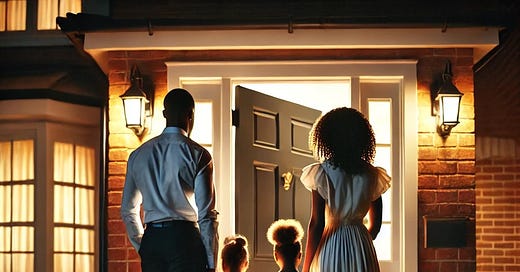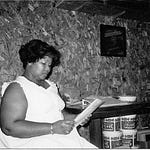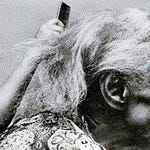I invited the Logan family for dinner and found myself unusually anxious. They were the first African Americans I had ever welcomed into my home, a milestone I was unprepared for. I just knew I would offend them by unconsciously saying or doing something racist. My home was in Kenwood, a predominantly white, upper-middle-class Minneapolis neighborhood that stood in stark contrast to the Northside community where the Logans lived. Poverty, drugs, and crime marked their street, yet they chose to live there, despite their successful corporate careers and the means to move to a safer, i.e., whiter, neighborhood. They said they wanted their children to grow up surrounded by people who looked like them. I couldn’t help but wonder if their choice was worth risking their safety.
When the Logans arrived, it was thirty minutes past dinner time. Don, known for his forgetfulness, had only remembered the street name, causing a delay that left me fretting. As they walked in, Don chuckled, “You’ll probably catch hell from your neighbors for scaring them to death. We had to canvass the entire block just to find you. You should’ve seen the looks we got when they saw a Black family on their doorstep after dark!”
I laughed along with Don and Beverly, but when I glanced at their daughters, who seemed on the edge of tears, the gravity of the situation hit me.
“It’s not funny, is it, Don?” I asked, my voice more careful now.
He shook his head, smiling sadly. “No, not really.”
This moment marked another awakening in my ongoing journey with race. In that instant, I was confronted with the privileges I had long taken for granted, and my acknowledged complicity in a system that perpetuated them. In Kenwood, city officials, law enforcement, and public services catered to our exacting standards while effectively writing off poorer parts of the city. In our neighborhood, police would closely monitor any group of Black men standing on a corner, or “suspicious” Black drivers frequenting the streets, probably before any neighbors called to report them. Halfway houses for addiction or rehabilitation centers for sex offenders were unthinkable within our ZIP code, but they crammed them into Don's neighborhood heavily populated with kids. I enjoyed these privileges, especially the luxury of taking them for granted. I never needed to explicitly express disdain for those less privileged, darker-skinned, or of different backgrounds; it was understood and excused as “just the way things are.” If ever my comfort was threatened, I could rely on fellow whites to voice their discomfort while I observed from my moral high ground.
But a child doesn’t grow up believing this is simply the way things happen to be. It’s personal. A child knows they are treated differently, even if the reason remains unspoken. Just as Don's daughters had sensed the uncomfortable stares, the awkward silences, or the tentative comments, they also understood deep down that they were not welcome here, that people didn't believe they belonged simply because they weren't seen as special enough. The causative link between my “specialness” and these girls’ rejection was undeniable. My choices were doing this to them.
That evening over dinner, and in later conversations with the Logan family, the artificial facade of my life in Kenwood shattered. Living there lost its allure as I realized it was a gated community in all but physical barriers. I developed corporate diversity and inclusion programs. I gave speeches about racism. I authored novels about race relations in America. But that night on my doorstep, I was blindsided by my ignorance. I needed to do something.
In response, I found a house in Don and Beverly’s neighborhood. I wanted to confront what had been invisible to me: my privilege and the true cost of being white in a world that often rewards and protects me reflexively and unjustly. I aimed to become more conscious of the ripple effects of my actions and decisions.
Being a minority white resident in a predominantly Black community unfolded differently than I had expected. Naively confident in my understanding of race relations, I imagined myself as an observer, perhaps even an educator to these folks. A real white savior.
Instead, I became more racist. Or rather, racist impulses I had kept in check when I was safely on my own turf, where I was more in control of my environment, suddenly blossomed when I experienced being in a world where I did not see my likeness reflected everywhere I looked. I became unsure of what the rules were, what people were thinking when they stared at me, when they approached me. Evenings when neighborhood kids innocently congregated in my driveway to play with the basketball hoop that the previous owners had installed, I imagined drug deals and gangland violence. When threatened or uncomfortable, I regrettably retreated to familiar patterns of racial superiority. I justified my insecurities by demeaning my new neighbors, casting them as “the other.” It was a regression to a mindset akin to that in Mississippi, where I saw Black individuals not as neighbors but as a threatening backdrop to my life. Confronting these thoughts became a daily struggle, battling the pervasive temptation to feel superior to those darker than I.
It was frustrating, and humbling, to say the least. It was bigger than me. Luckily, I found a way of thinking about racism that gave me hope for recovery. I equated it with my alcoholism and started to view racism as not something to be overcome, but an overwhelming part of me I had to accept. A despicable attitude I would never completely eradicate, but one I could make headway on. Progress, not perfection.
As a recovering alcoholic, I have learned that I will forever have the urge to drink, but the difference is, I can choose not to. I learned that same lesson about racism during the years I lived on the Northside. I will forever struggle with the temptation to feel superior. The triggers for those thoughts are everywhere—from the 10:00 news coverage of drug busts and murders to newspapers, movies, billboards, and shopping malls. For a white person to live inside this American culture that flatters them because of their color is like an alcoholic stepping into a bar. The temptation to feel better than dark-skinned folks is in the very DNA of our race-based society.
To recover, instead of denying my urges or making promises I will never be tempted again, I try to acknowledge them. When they arise, I practice telling them, “No, not now, not today.” But I have no illusions that those urges will not return. I must engage in a rigorous, ongoing, honest dialogue with myself and others to “stay sober.”
So, yes, I’m always going to be a racist. Living in a culture designed to normalize and even commodify racism, without a certain amount of vigilance, I will undoubtedly regress. The way I see it, it’s in the water, and we all get wet. The only hope is to acknowledge the impulse, make different choices, and move on, one day at a time.














Share this post